

On a finite planet economic growth cannot continue forever. As growth continues to deplete fossil fuels and to ruin the environment and climate, there must come a time when growth either levels off to a steady state or decreases. If humans are not smart enough to achieve a steady-state economy, growth will stop and the economic decline will ensue.
There are many ways to look at the current economy to try to understand how it could change to a steady-state economy. In this article I will look at some of the ways:
In a previous article I projected world population into the future. I updated that work by fitting three functions to the data:
 |
 |
The black curve is the best fit to the data; it has a final steady population of ~10.5 x 106 people.
I doubt that a steady population of ~10 billion can last for very long. It will probably reduce to several billion below that.
Of course population grew rapidly because energy availability from fossil fuels grew rapidly.
In a previous article I assumed that the final world steady energy use per capita could be equal to the current U.S. energy use, ~12 kW per person (350x106 BTU/person/year):
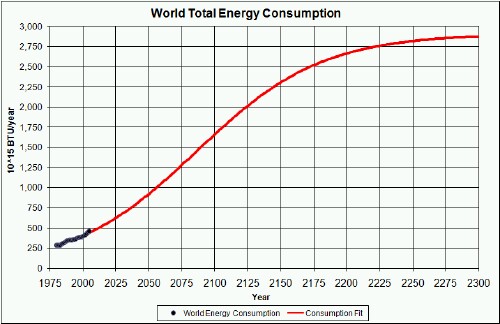
In that article I made several reasonable assumptions about energy obtained from fossil fuels as they are depleted:
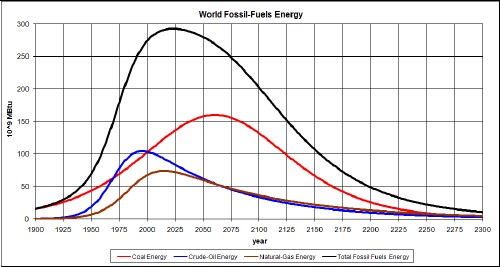
(Of course, fossil-fuels depletion has an aspect of good news, they cannot contribute to putting carbon into the atmosphere after they are used up.)
This left a large amount of energy "needed" to be obtained from renewable sources:
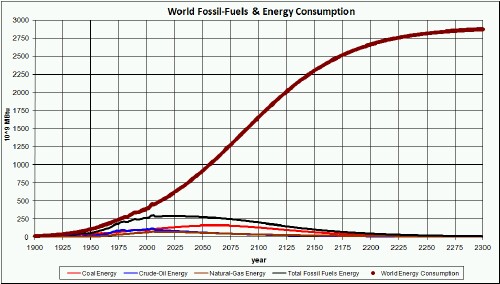
Adding possible nuclear energy was shown to be negligible.
Using the rapid onset of renewable wind, photovoltaic and biodiesel energy, I was able to show that it is reasonable to expect that those and other renewable energy sources could fill the gap:
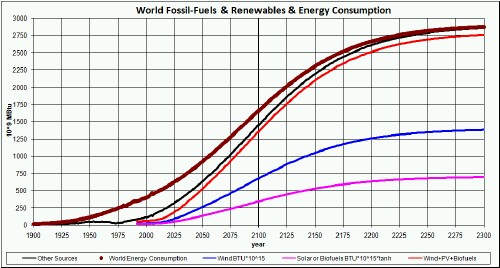
Commentators often talk about improving technology providing energy as it is needed. That technology will be better ways to collect solar energy and store it. (For example, see Lolland Hydrogen Community.)
Not only do fossil fuels deplete but also other industrial minerals deplete. Many industrial minerals can be recycled, but the Second Law of Thermodynamics (Law of Increasing Entropy) demands that some is chaotically spread over the planet at each recycling. For example, some reasonable assumptions about iron depletion and recycling yield:
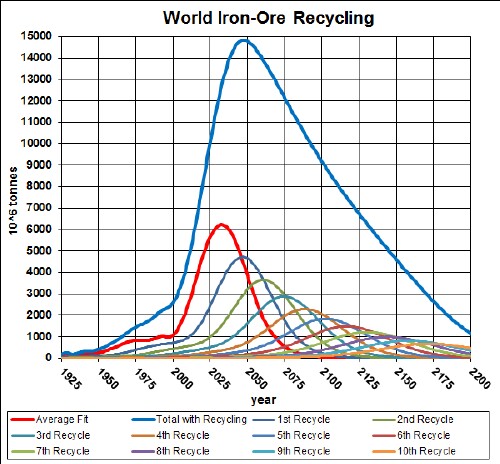
So, in about two centuries renewable materials have to substitute for iron. (Other possible mineral substitutes, e.g. aluminum, will also be depleted.)
An excellent book about recycling is Getting to Zero Waste by Paul Palmer. He gives five laws of universal recycling:
The rapid use of energy from fossil fuels not only allowed population to grow rapidly but it also allowed gross domestic product to grow rapidly.
The Gross Domestic Product is not a good measure of social health, as it includes expenditures for undesirable events as well as good ones. (See references below for better measures.) Here I only use data for the United States, not the world.
I fit the data for the U.S. GDP adjusted for inflation (in 2005 $) with the hyperbolic tangent as a way to move to steady state.
U.S. GDP (10^6 2005 $): |
 |
|
U.S. GDP/Capita (2005 $): |
 |
|
The fitting equation is ![]() .
.
The ratio between the asymptotic values GDP/GDPperCapita = 331,328,000 people. (The U.S. population at the end of 2010 was ~308,745,000.)
A better indicator of societal health is the Genuine Progress Indicator (GPI).
Given the fact that fossil-fuels and industrial-minerals extraction are or soon will be peaking, it appears unlikely to me that a world population of ~10.5 x 106 people can be maintained for centuries. The steady state will probably be considerably lower than that when humans will have only renewable energy and materials to use.
I highly recommend the book The Ecotechnic Future: Envisioning a Post-Peak World by James Michael Greer. He categorizes the development of human society as:
The final ecotechnical society is only reached if humans are intelligent enough to carry technical knowledge into the far future; otherwise the final steady-state society might be hunter gatherer as at the beginning.
I also recommend Peak Everything: Waking Up to the Century of Declines by Richard Heinberg. He gives five axioms of sustainability:
Finally, I recommend that the on-line book, Enough is Enough: Ideas for a Sustainable Economy in a World of Finite Resources.
Final question:
Can a corporate capitalist economy smoothly transition to a steady-state economy?
My answer:
Probably not. It probably has to collapse and then rise to a steady-state.
L. David Roper, http://www.roperld.com/personal/roperldavid.htm; roperld@vt.edu
5-apr-16